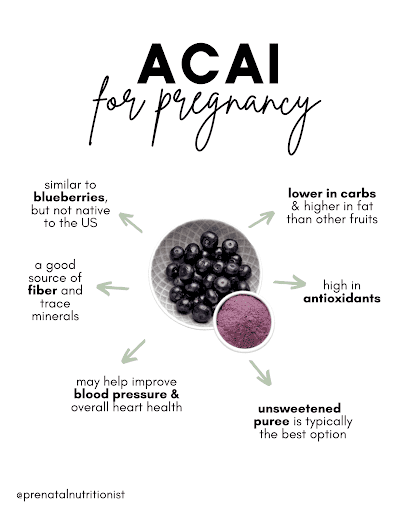What are acai berries?
Acai berries are a fruit product that comes from the acai palm tree, native to tropical Central and South America. The fruit is a deep purple-colored berry that serves as an important food source for the indigenous people of the Amazon; and has gained popularity for its antioxidants and flavor in recent years [1, 4].
Their popularity in the US may be partly because Oprah named them a ‘superfood’ (quotes because this is not a scientific term) on her show because the acai berry contains more antioxidants than blueberries, strawberries, and cranberries [5].
The acai palm trees can grow up to 60 feet high in the Brazilian rainforest and since harvesting is done by hand, locals scale dangerous heights to harvest them [5]. These berries also spoil very quickly, so harvesting, processing, and shipping is a very fast process. This is the reason why raw acai berries are very hard to come by here in the US. While they can technically be eaten raw, they are usually consumed in the form of juices, frozen puree, smoothies, sauces, gummies, powders, and other dietary supplements.
As we talk about here often, food in its most whole form is always our the best option!
Are acai berries safe during pregnancy?
Mostly, but it depends!
According to the NIH, there is very little information known about the safety of eating acai during pregnancy or while breastfeeding [6]. However, most registered dietitian sources claim it to be safe for pregnant mamas to consume, but you’ll have to be careful about how it is prepared and aware of the potential risks.
After all, it is much like any other berry just not native to the US!
Acai Berry Nutrient Breakdown [9]
In 1 packet of acai puree:
- 60 Calories
- 2 g Protein
- 5 g Fat
- 6 g Carbohydrates
- 3 g Fiber
- 40 mg Calcium
- 1.08 mg Iron
- 7 mg Sodium
- 9.6 mg Vitamin C
- 1000 IU Vitamin A
What are the benefits of acai berries?
At this time, more research needs to be conducted on humans on the health benefits of acai products [4]. However, we can go through the current limiting research that is out there about acai and its potential health benefits.
Nutrient-dense
The nutrition profile for acai is quite unique for fruit because they are actually a little higher in fat and lower in sugar [10]. Additionally, they contain essential trace minerals like chromium, zinc, iron, copper, manganese, magnesium, potassium, and phosphorus, according to a Venezuelan study [11]!
Acai berries also contain anthocyanins – these are plant compounds that give acai their deep purple color. Anthocyanins are known to possess antidiabetic, anticancer, anti-inflammatory, antimicrobial, and anti-obesity effects [12]. Acai berries are also higher in antioxidants than other berries we commonly eat and are a good source of fiber [13].
May improve brain cognition and memory
Due to their antioxidant-rich qualities, acai berries could improve cognitive and motor functions – according to an animal study from the Journal of Agricultural and Food Chemistry [14]. Another animal study found that acai berries could protect memory during aging because of their anti-inflammatory properties [15].
May improve cholesterol levels and lower the risk of heart disease
According to an uncontrolled pilot study, eating 100 g of acai pulp twice a day for one month can help reduce cholesterol levels in overweight individuals [16]. Another study found that anthocyanins and flavonoids (such as those found in acai berries) contribute to the prevention of hypertension and subsequently, lower the risk of heart disease [17].
New research showed that acai supplementation in animal models improved maternal hypertension and reduced the chances of intrauterine growth restriction. The researchers noted this is likely due to the antioxidant content of acai.
May help decrease inflammation
An interesting study completed in rats during pregnancy found acai supplementation with the control diet resulted in improved lipid profiles, better glucose levels, and improved gut microbiota. They also noticed an improvement in inflammation in the colon among the offspring. All these benefits sound nice but remember humans are pretty different than rats.
A more recent study showed that acai intake among healthy women (yes, humans this time) had no effect on inflammatory biomarkers, but the researchers did state inflammation is a product of the diet as a whole. This we know, studying individual foods and even individual nutrients is hard due to the synergistic effect of foods, and the effect all the foods we consume have on inflammatory biomarkers.

Are there any risks to enjoying ‘acai’ during pregnancy?
Supplement and powders
Acai powder is essentially finely ground-dried acai berries, and since all the water has been removed, it is an extremely concentrated product. It’s popularly used as a supplement. The lack of research done on acai as a supplement makes it safe to advise that excess intake should be avoided during pregnancy. It’s best for pregnant mamas to stick to one serving of acai powder a day or better yet, focus on the puree packets with no added sugar as the best option.
 Acai juice
Acai juice
Acai juice is commonly added to drinks, smoothies, and the famous Starbucks Strawberry Acai Refresher which contains 45 mg of caffeine. The same rule for juices during pregnancy applies here as well, always go for pasteurized or filtered juices.
One risk of drinking unpasteurized acai juice is Chagas Disease or American Trypanosomiasis – a tropical, parasitic, life-threatening disease that can induce cardiac and digestive complications [18]. Although this disease is not common in the US (most cases have been reported in the Southern United States), it’s a good thing to consider when traveling to countries in South America, Central America, and Mexico; or if you or your family spend a lot of time outdoors in tropical areas [19].
What about ‘acai bowls’ at local shops?
One of the most popular ways we enjoy acai in the US is the trendy acai bowl. These bowls are made from a frozen acai puree as the base and then decorated with multiple toppings. These bowls are commonly offered in a thick, creamy consistency using a soft-serve style ice cream machine or out of big “ice cream” like tubs.
Are they safe for pregnancy?
The concern with any ‘soft-serve’ machine is the cleanliness. They are breeding grounds for bacteria when not properly cleaned, namely Listeria – known for their capability to cause serious complications during pregnancy, including miscarriage, stillbirth, premature delivery, or newborn infection. It’s important to remain cautious of this risk. I personally have not come across a place that uses a soft-serve machine for acai living in Southern California.
No matter the tool that is used, make sure you go to a reputable acai bowl shop that is diligent in their cleaning practices; one that you trust. You can always talk to a manager to ask about cleaning protocols. Getting your acai bowl from street vendors or at local fairs is not a good idea since they aren’t likely to have clean and sanitized equipment [20].

High in Sugar
Acai bowls are definitely a sweet treat, which is completely okay once in a while and won’t harm you or your baby. However, habitual consumption of acai bowls, especially from local shops likely with plenty of added sugar can quickly add up. A diet high in sugar that leads to excess weight gain during pregnancy can increase a pregnant mama’s risk for several unwanted pregnancy complications [21]. Learn more about sugar consumption during pregnancy here.
Ordering recommendations
To make your acai bowl a more balanced treat, consider topping it with plant-based fats and protein like hemp seeds, chia seeds, flaxseeds, dark chocolate, and nut butter.
Not only will it make your snack more delicious, but it will also make it more filling and provide you with longer-lasting sustained energy! You can take these recommendations into consideration when making acai bowls at home also. If you’re buying unsweetened frozen acai puree, you can always top it with some banana, honey, or maple syrup to sweeten it up!
Can I enjoy it if I’ve been diagnosed with gestational diabetes?
The main goal for pregnant mamas with gestational diabetes is to control their blood sugar levels. Acai bowls tend to be high in carbohydrates (the only macronutrient that significantly affects blood sugar) – from the fruit, sweeteners, and toppings. This doesn’t mean pregnant mamas can’t enjoy a nice cooling bowl of acai, but it’s important to prepare for it, and know-how to order.
Make sure you check your glucose numbers before and after to see how they are affected. It might be a better idea to share the bowl with your partner or a friend because some bowls could have up to 60 g of carbohydrates, and even more when considering toppings.
If your bowl is blended fresh, add a protein like a peanut butter, protein powder, and hemp seeds. It is also great to add these as toppings to boost the protein and fat content. In addition, you could pair it with an outside protein source like a piece of cheese, jerky, or yogurt.

What to look for when purchasing acai at the store
There are lots of acai products on the market, and it can be confusing to choose the brand that’s best for your health goals during pregnancy. We want to consider two main things – pasteurization and no added sugars. When you’re browsing your grocery store’s freezer aisle, look for acai packets that are unsweetened and acai juice that is pasteurized or filtered.
Here are a few great brands to try:
How to enjoy acai at home
How can we put this delicious treat together?
Acai bowls are fairly quick to make and require 3 components: acai berry puree, fruit, a protein (almond butter, peanut butter, protein powder), and your favorite toppings! I’ve listed a few more different ways you can enjoy acai at home for a fraction of the cost and still get all the amazing benefits of fiber, antioxidants, and healthy fats.
- Customizable acai smoothie bowls
- Acai oatmeal yogurt bowls
- Fruit salad with honey acai dressing
- Acai Smoothies
- Acai Lemonade

The Bottom line
- Acai is a berry that looks like blueberries but is not native to the US; Brazil is where they are mainly grown and harvested. While acai is safe, the research on pregnancy and breastfeeding is limited.
- Acai is high in antioxidants, fiber, and trace minerals, and is slightly lower in carbs and higher in fat than most fruits. It is best enjoyed in low to moderate amounts.
- The best options for at-home use are unsweetened acai frozen packets/purees. You can add your own sweetener when making smoothies like a drizzle of honey or maple syrup.
- Avoid acai powders and supplements during pregnancy as they are not FDA regulated nor have they been proven safe.
- If you’re going to enjoy an acai bowl at a local shop, make sure the shop is a clean, reputable place you trust that follows food safety protocols. If you can choose, the unsweetened or freshly blended option with toppings like nut butter and seeds.
Written by: Nina Cassett & Laima Numan, Dietetic Interns, and Ryann Kipping, MPH, RDN, Owner + Founder

